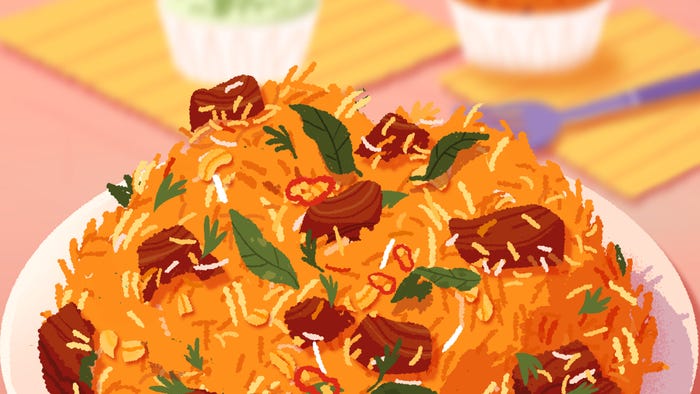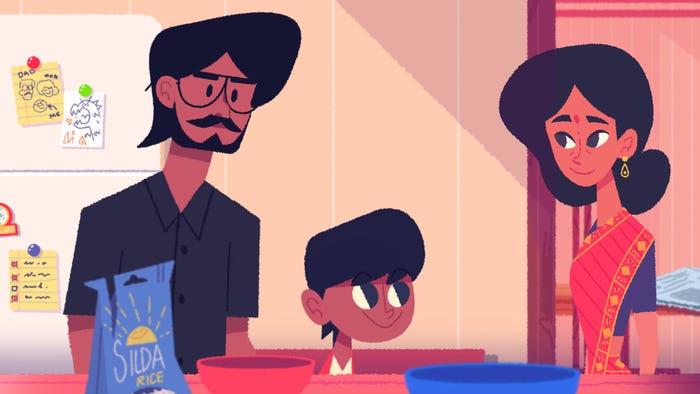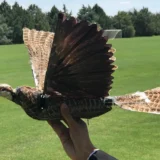How Venba uses food to explore connections and disconnections with culture for immigrants
The IGF (Independent Games Festival) aims to encourage innovation in game development and to recognize independent game developers advancing the medium. Every year, Game Developer sits down with the finalists for the IGF ahead of GDC to explore the themes, design decisions, and tools behind each entry. Game Developer and GDC are sibling organizations under Informa Tech.
Venba explores an Indian mother’s story of immigrating to Canada through food, seeing players cook and savor South Indian cuisine as they experience this family story.
Game Developer caught up with Abhi, the game’s designer, to talking about food as a means of delving into the experience of immigrants, finding natural puzzles in the cooking of South Indian dishes, and the thoughts that go into creating food visuals that capture a sense of deliciousness.
Who are you, and what was your role in developing Venba?
I’m Abhi. I’m the designer and writer of Venba.
What’s your background in making games?
While I always wanted to get into making my own games, I started my career with working at a mobile game studio as a programmer. That’s where I met the artist of Venba, Sam Elkana. We would always talk and work on side projects together. One of those ideas is what eventually became Venba!
Images via Visai Games
How did you come up with the concept for Venba?
I remember it very vividly! It came from observing my mother fussing over food and had me thinking about the role food plays in South Asian cultures. Especially in immigrant families, I find food becomes the bridge between first generation immigrants and their assimilated children. I thought it would be interesting to explore this story through the lens of food.
What development tools were used to build your game?
We used the Unity game engine.
Venba explores South Indian food and family across several generations. What interested you in exploring this family connection through food and cooking?
I wanted to explore how the family grows and changes in their time in Canada. To measure if something is changing, you need something that stays constant, and to me, food seemed like the perfect fit. Both Venba and Kavin are restoring age-old recipes but how they feel about them changes depending on their circumstances. For Venba, as Kavin grows apart, food and cooking increasingly becomes a vital link to her culture and a way to communicate with her son with whom she has real language barriers. For Kavin, as he faces the pressures of assimilation, he wants to disassociate with the food until he learns to make his peace with it.
What thoughts went into turning cooking these dishes into gameplay? How did you create a kind of puzzle-like play around preparing these dishes?
I wanted to approach it in a very different way to other cooking games which are more arcade-centric. I wanted to see if I could put a focus on the recipes themselves, which is what lead to the puzzle mechanics and the core theme of restoring lost recipes. I was able to find a lot of fun in recreating the physicality of the cooking utensils itself.
For example, the older idli plates had holes and specific configurations, so that felt like a puzzle in-and-of itself. So, finding the puzzles in the recipes themselves and bringing them into the game was a lot of fun.

Images via Visai Games
How did you choose the recipes you put into the game? Can you tell us a bit about your process in picking which dishes to use, especially as they are part of the narrative as well?
Initially, I had a lot of trouble picking recipes as I was trying to pick what recipes best represent South Indian cuisine. I also felt like I had to represent certain cornerstones of the cuisine. Eventually, letting go of that and focusing on what recipes lead to fun gameplay really helped. So, I picked recipes that I thought were most interesting to cook for the players and I felt that process led to a more interesting game.
Venba features a striking visual style that really makes the food look delicious. What thoughts went into creating the visual style? What ideas go into making food that looks really, really good to eat, visually?
All credit to Sam Elkana, our art director. Sam is heavily inspired by 90s cartoons like Samurai Jack. Sam was able to strike a neat balance between recreating these classic dishes with his own unique art style. The best way we were able to capture the food and it’s essence is by educating the entire team with it. We did that in various ways, sometimes going to restaurants and sometimes recreating the food ourselves.
Likewise, what work went into capturing several generations of characters, fashion styles, and living spaces as you delved into the family’s story over the years?
For this, we just relied heavily on references. A wealth of references existed in Tamil movies to draw from. Also, showing the game to family and friends who share this culture really helped recreate a lot of details authentically.

Images via Visai Games
You also take players across time using Tamil music across generations. What ideas went into creating this soundtrack and the ways it shifts through different stages of the family’s lives?
One of the things I’m super happy about Venba is the soundtrack and all the details we were able to cram into it. Early on, we had the idea that the songs in the soundtrack should reflect the era the family is in. So for this, we made each song almost an homage to a different music director who was prominent at the time. This was a lot of fun to do, and for the Puttu level, we actually were able to get the composer who the song was an homage to, to actually sing in the song itself!
Did some of your own family stories, histories, and experiences work their way into the game? Can you tell us a bit about how these stories would shape Venba?
Yes and no! I would say me and my family are very different to the one portrayed in Venba. However, my experiences of other South Asian families here did inform a lot of Venba. I specifically remember one instance where I had to act as the translator for my very-assimilated friend and his first generation immigrant mom and the idea that a mom couldn’t speak freely to her own son was bothering me. Experiences like that is what I wanted to showcase in Venba.
What do you hope the player takes away from sharing this experience of being an immigrant in a new country? In exploring how food can be integral parts of heritage, family, and connection?
When I pitched this idea to Shahrin Khan, my producer said this is the kind of game that would make people call their moms. I remember thinking that if that happened, I would really be happy with it. Since the game released, there’s been an outpour of accounts of people contacting me to say that they called their mom as soon as they finished the game!












